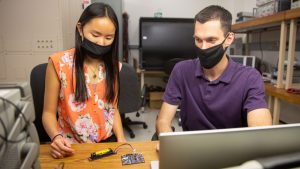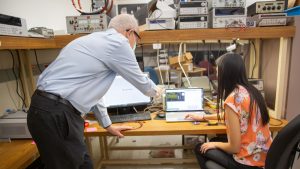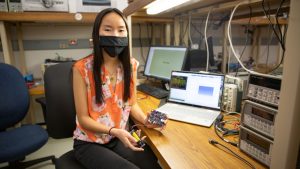Kylie Welch
Electrical engineering
Hometown: Scottsdale, Arizona, United States
Graduation date: Spring 2022

FURI | Spring 2021
Implementing Bio-Inspired Frequency Detection on an FPGA
Similar to how animals use signals of varied frequencies to detect and locate objects, a fast Fourier transform (FFT) will allow for an efficient way to analyze signals. Implementation of this fast, low-power method on a field-programmable gate array (FPGA) will enable remote, autonomous object sensing and detection systems. With the advancements in technology, faster sensors will be needed to keep systems secure.
Mentor: David Allee
Featured project | Spring 2021
Kylie Welch is an electrical engineering junior conducting research in the FURI program. She is working on improving remote sensing applications with her mentor, Professor David Allee. Her research involves fast, low-power algorithms that can improve execution times required to analyze frequencies used in remote sensing.
What made you want to get involved in FURI?
Being able to see how my coursework applies to engineering has always been exciting. After taking more specialized engineering classes, I learned about some interesting topics relating to electric fields and signals. FURI has allowed me to gain hands-on lab experience and apply my coursework to help solve real-world security challenges.
Why did you choose the project you’re working on?
Due to my interests in nature and animals, I chose this project to gain insight on the generation of electric fields and signals in nature. I was interested in how this could be used in the development of remote sensing on low-power devices.
What has been your most memorable experience as a student researcher in FURI?
My most memorable experience was when I was able to successfully analyze a digital signal using a fast Fourier transform, or FTT, algorithm. This showed how it is possible to utilize a fast, low-power algorithm for signal processing and analysis.
Have there been any surprises in your research?
I have learned that the development of low-power devices is very useful for security applications. It is surprising to see the increasing need for remote sensing and how there are a variety of uses for fast, low-power signal algorithms.
How will your engineering research project impact the world?
This research will show how mimicking animal mechanisms as alternative, bio-inspired solutions can be used to solve real-world security issues. The insight gained from this research will help in the development of fast, low-power algorithms for use in sensing and object detection.
How do you see this experience helping with your career?
This undergraduate research has enabled me to learn about future technologies within the engineering field. The hands-on experience has allowed me to develop critical thinking skills needed in coursework, internships and my future career.
What is the best advice you’ve gotten from your faculty mentor, Professor David Allee?
Go into a field that you are passionate about and will enjoy working on every day.
Why should other students get involved in this program?
FURI has allowed me to see the connections of my coursework to real-world challenges by researching interesting topics. Connecting with my faculty mentor and other students has helped me develop my current and future career goals.


